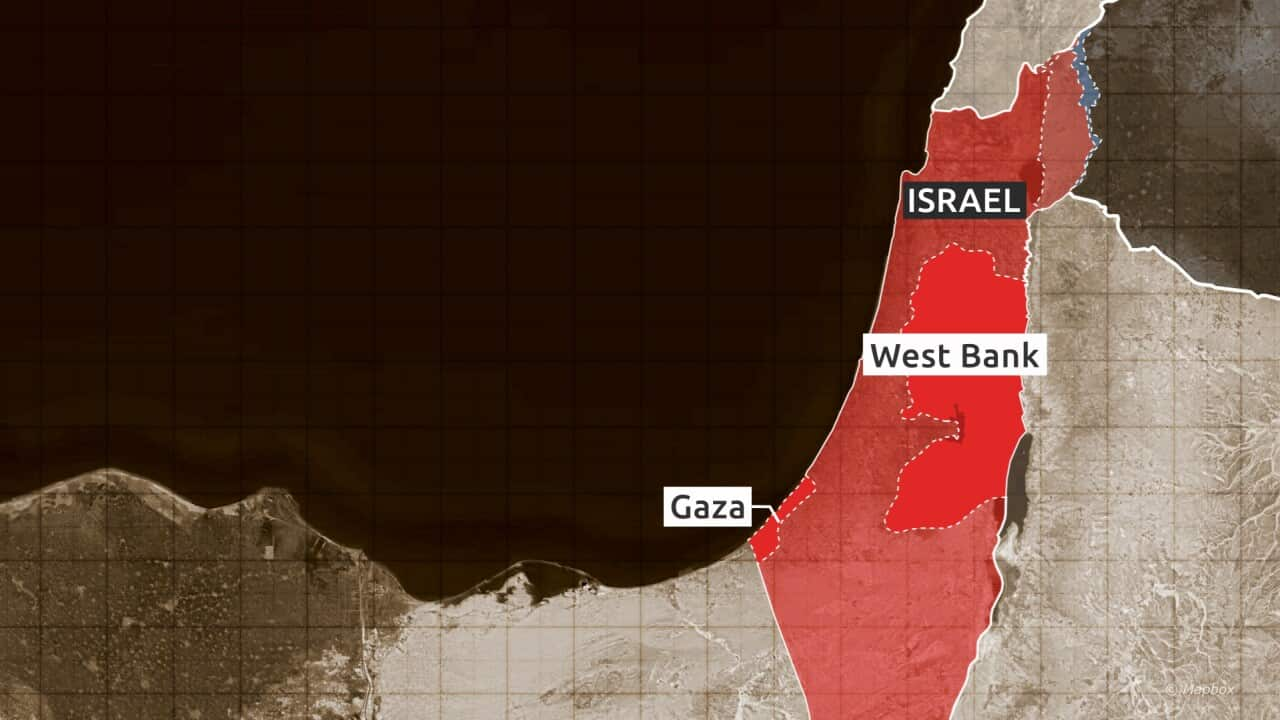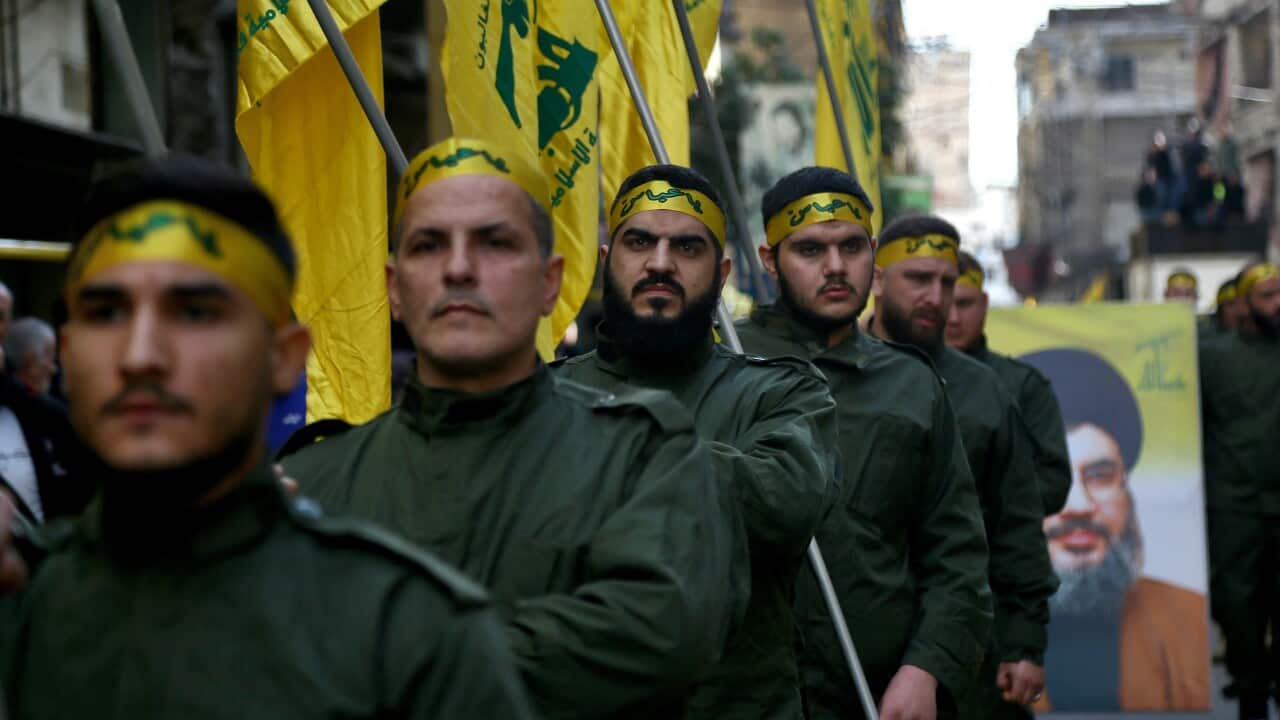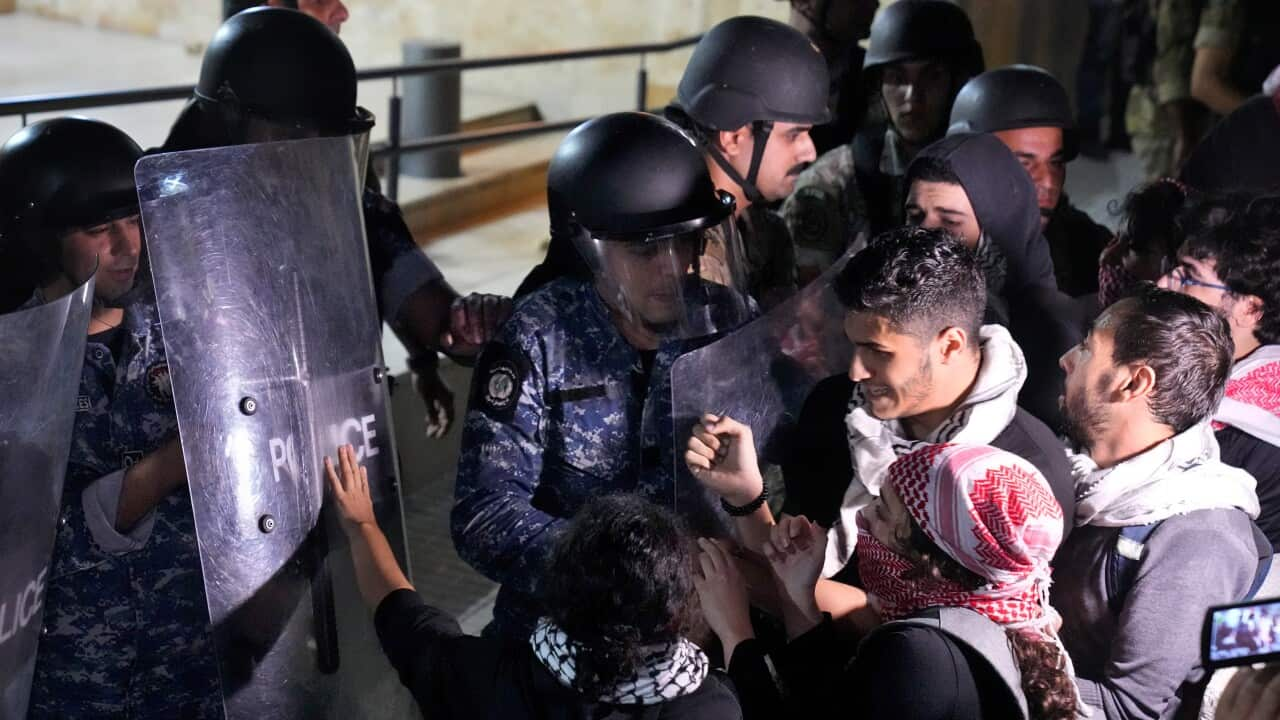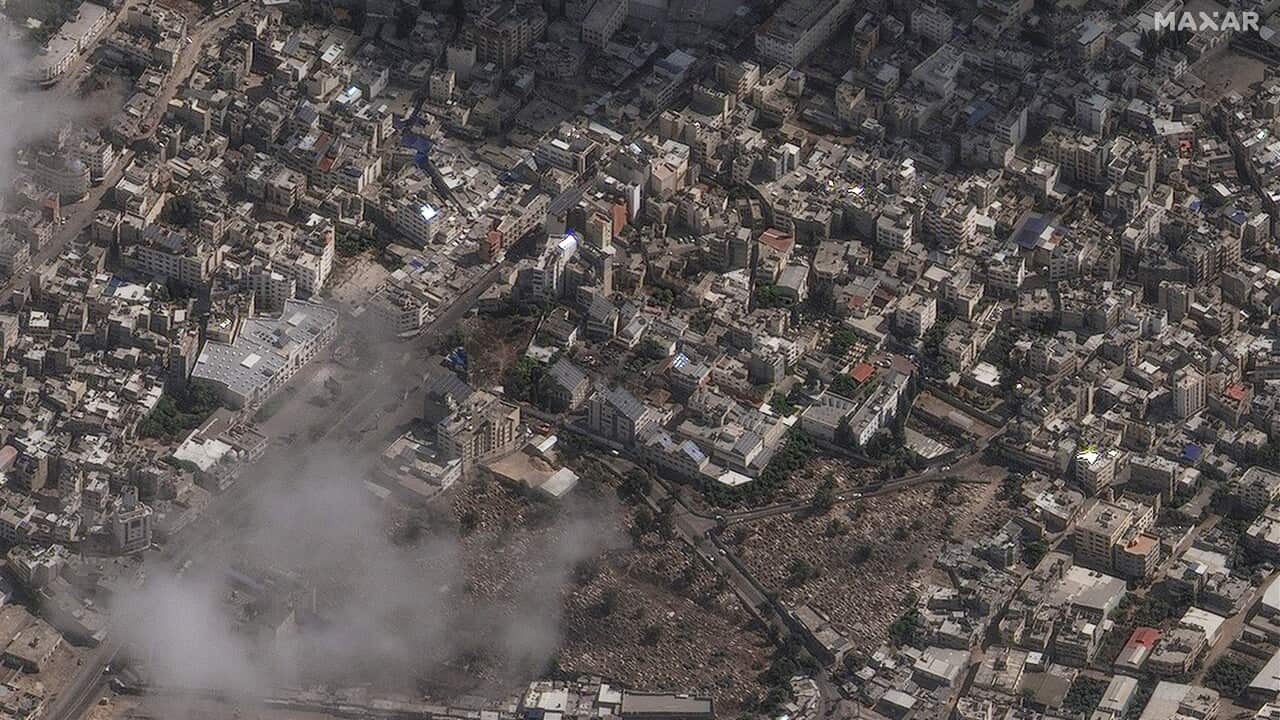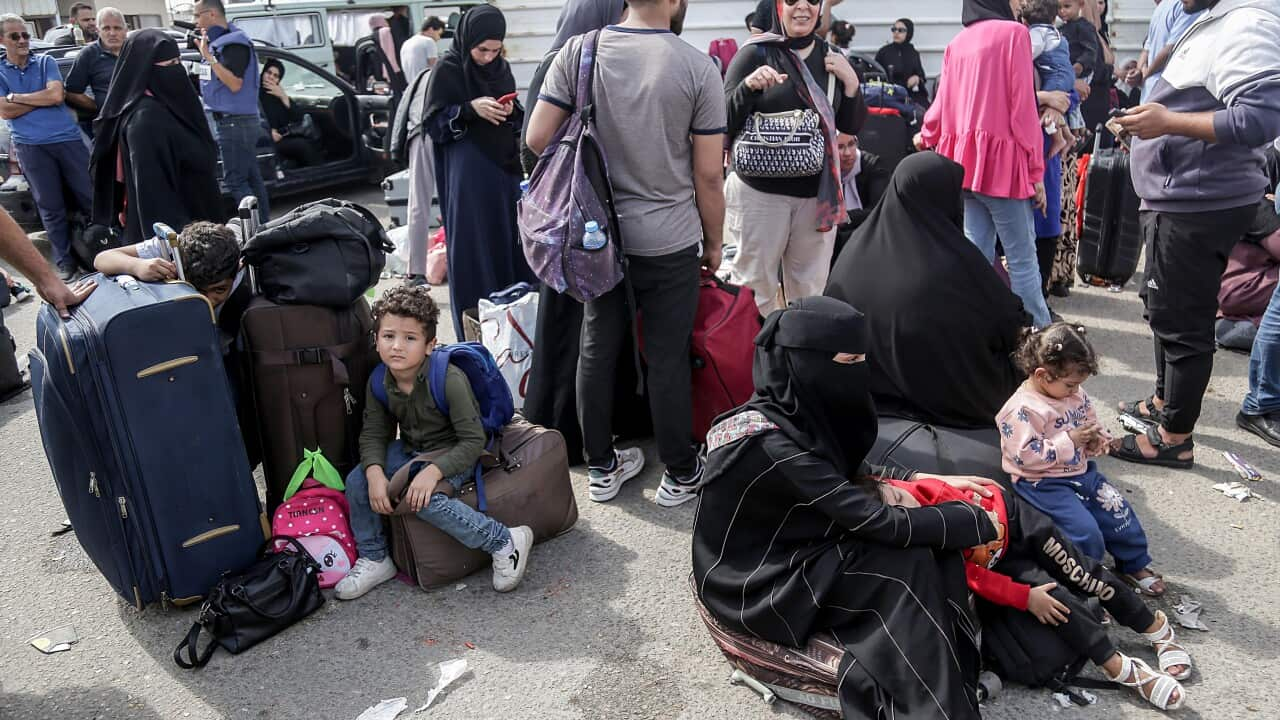Israel has normalised relations with two of its direct neighbours, while several other states and groups in the Middle East are seen as hostile to, or outright enemies of, the Jewish state.
Iran's Foreign Minister Hossein Amir-Abdollahian warned Israel that the Middle East could spiral out of control if Israel does not stop that started in response to on 7 October.
"I warn the US and its proxy Israel that, if they do not immediately stop the crime against humanity and genocide in Gaza, anything is possible at any moment and the region will go out of control," Amir-Abdollahian said at a news conference in Tehran on Monday.

Iranian Foreign Minister Hossein Amir-Abdollahian warned the US and Israel to stop attacks on Gaza, saying that if they don't there will be many consequences and chaos in the region. Source: AAP / Abedin Taherkenareh/EPA
But many countries in the region share he said.
Sally Totman is a Middle East specialist at Charles Sturt University. She said conflicts in the region have historically involved neighbours being dragged into disputes with other neighbours.
She said governments of countries such as Egypt, Jordan and Lebanon are walking a very fine line at the moment in disagreeing with Israel's treatment of Palestinians but also protecting their own interests and keeping a distance from Hamas.
"I think there's zero support for Hamas attacking civilians, kidnapping civilians. I think there's zero support anywhere in the world for that kind of behaviour," she said.
Here's a look at how Israel's neighbours have responded to the , in which over 4,600 Palestinians and 1,400 Israelis have so far reportedly been killed.
Iran
On 15 October, Iran's UN mission assured the world that its armed forces wouldn't intervene in the conflict unless Israel attacked Iranian interests or citizens.
, finds itself in a quandary as it tries to manage the spiralling crisis, nine Iranian officials with direct knowledge of the thinking within the clerical establishment told Reuters.
Standing on the sidelines in the face of an all-out Israeli invasion of Gaza would significantly set back an Iranian strategy for regional ascendancy pursued for over four decades, according to the people, who asked to remain anonymous due to the sensitivity of the discussions in Tehran.
Yet any major attack against a US-backed Israel could exact a heavy toll on Iran and trigger public anger against the clerical rulers in a nation already mired in an economic crisis, said the officials, who outlined the various military, diplomatic and domestic priorities being weighed by the establishment.
Three security officials said a consensus had been reached among Iran's top decision-makers, for now: Give their blessing for limited cross-border raids by its Lebanese proxy group Hezbollah on Israeli military targets, over 200 km away from Gaza, as well as low-level attacks on US targets by other allied groups in the region.

Israelis evacuate a site struck by a rocket fired from the Gaza Strip, in Ashkelon, southern Israel. Source: AP / Ohad Zwigenberg
"We are in contact with our friends Hamas, Islamic Jihad, and Hezbollah," Vahid Jalalzadeh, the head of the Iranian parliament's National Security Committee said on Wednesday, according to Iranian state media. "Their stance is that they do not expect us to carry out military operations."
Hamas is a Palestinian military and political group, gaining power in the Gaza Strip since winning legislative elections there in 2006.
Its stated aim is to establish a Palestinian state, while refusing to recognise Israel’s right to exist.
Hamas, in its entirety, is designated as a terrorist organisation by countries including Australia, Canada, the UK and the US.
Some countries list only its military wing as a terrorist group.
Lebanon
Hezbollah and Israel have been trading fire over the Israel-Lebanon border with increasing frequency since 7 October and the situation has become tense, with and
On Sunday, Hezbollah announced the deaths of six of its fighters, raising to 26 the number of its members killed in the worst escalation in violence along the frontier since Israel and the Iran-backed group fought a war in 2006.
Hezbollah is a Lebanese Islamist political party and militant group formed in 1982 after Israeli forces invaded southern Lebanon that year. It is backed by Iran and leads a multi-party alliance that holds just under half the seats in Lebanon's parliament.
Hezbollah is listed as a terrorist organisation by countries including Australia, the US, Germany and the UK. The European Union lists only its military wing as a terrorist organisation.
However, Hezbollah itself makes no distinction between its political and military wings.
"The Lebanese state and the majority of Lebanese absolutely don't want to have conflict with Israel, it never ends well for them. Hezbollah certainly doesn't speak for the majority of the Lebanese population but Lebanon doesn't have a functioning government.
"Hezbollah runs an enclave within a state. So even if other parties wanted to stop Hezbollah, there's no way of doing it. Lebanon has got its own political catastrophe, and economic catastrophe, so in short, Hezbollah does what it likes."
She said the amount of rockets launched by Hezbollah is "very minimal".
"Yes, they're sending some missiles over the border to say we ideologically support the Palestinians and are taking attention and resources away from bombing Gaza. But they're not doing enough to warrant a huge response from Israel."
Israel has warned it will hit back very hard against Hezbollah, which has said it is fully ready to contribute to the conflict "when the time comes."
Parmenter said: "Hezbollah has about 100,000 militants but how effective they would be against an organised Israeli army with high-tech weapons and support from the US, I'm not sure."
Syria
Rockets have also been launched from Syria into Israel in recent weeks.
has ties with Iran and may be compelled to follow Iran's course of action but Israel has already warned Syria not to get involved by bombing Aleppo and Damascus airports on Sunday, Parmeter said.
"The main purpose of that bombing is probably to prevent Iran sending munitions and rockets, to Hezbollah, through Syria.
"I don't think Syria is likely to get directly involved. They still haven't recovered from the civil war which began in 2011, and Iran wouldn't want them to suffer a destabilising ground invasion by Israel," he said.
Egypt
Egypt shares a border with the Gaza Strip and controls the Rafah border crossing, where limited aid has finally been able to get to Palestinians running out of water, fuel and food under an Israeli blockade.
But Egypt has said it won't take in Palestinian refugees from Gaza.
Egypt's foreign affairs minister has cited the "economic burden" and not wanting to solely bear the "responsibility".
The country has long been considered a "moderate Arab state" and is walking a diplomatic tightrope at the moment, Totman said.
Egypt has had a peace treaty with Israel since 1979. "Egypt and Jordan have got long-established diplomatic and economic relations and limited political relations with Israel.
"They also share borders with Israel, so their role is particularly important in stabilising the situation."
Jordan
Jordan has had a formal peace agreement with Israel since 1994 and is playing a similar negotiating role to Egypt, Totman said.
"We don't tend to talk about it as much but Egypt and Jordan are both each benefactors of American aid, which is really a reward for the peace that they keep with Israel."
Last week Jordan cancelled a summit with US President Joe Biden after an explosion at the al-Ahli Arab Hospital in Gaza City killed hundreds.
Egypt and Jordan are showing absolutely no signs of wanting to rip up their peace treaties with Israel, Parmeter said.

